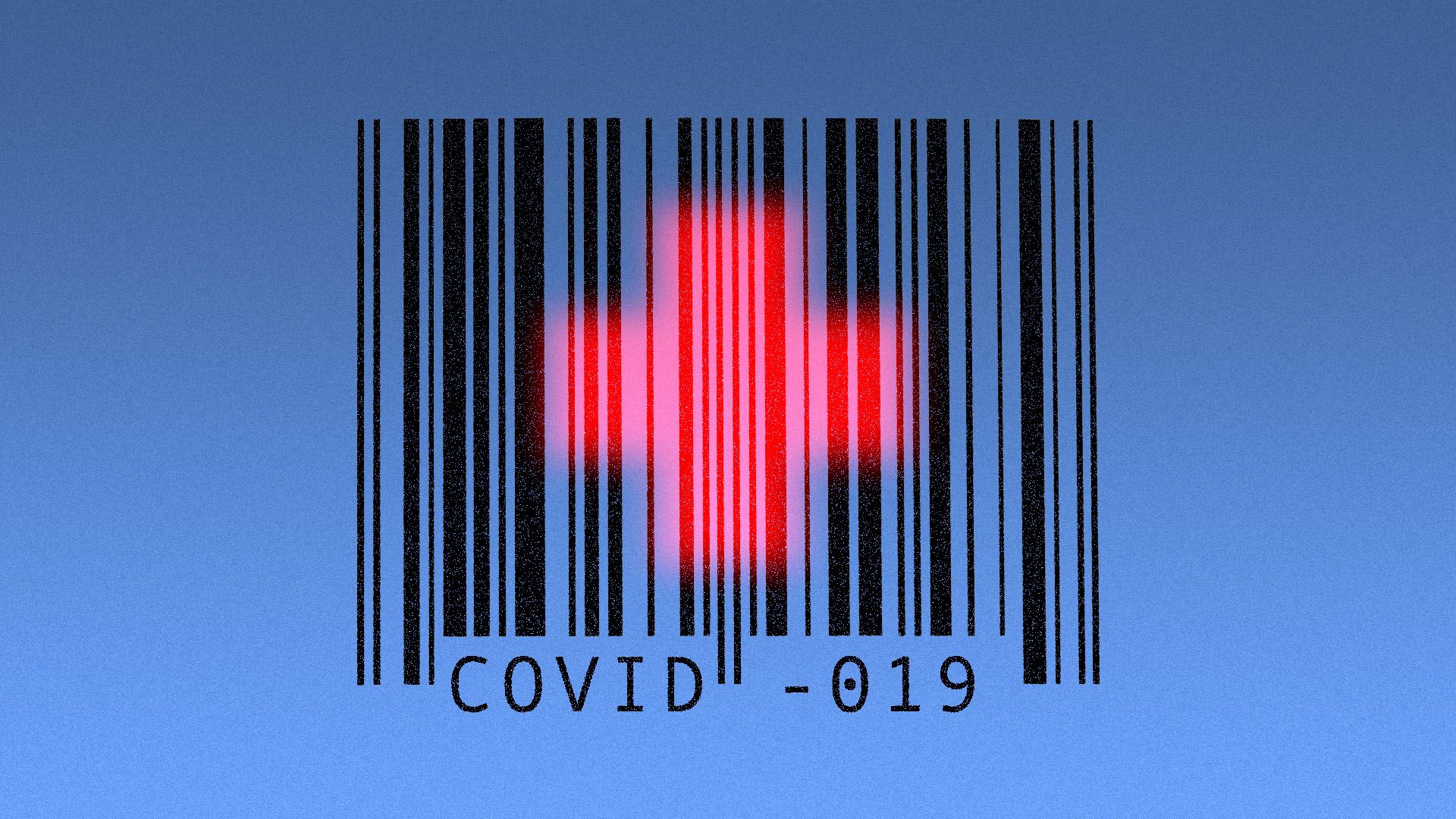The brave new world of digital coronavirus screening
Add Axios as your preferred source to
see more of our stories on Google.

Illustration: Sarah Grillo/Axios
Employers emerging from lockdown are looking to new COVID-19 screening tools to help workers get back on the job.
Why it matters: Neither employees nor customers are likely to return to businesses if they fear infection, so there needs to be some way to separate the sick from the well. But many new screening services are untested, and could open the door to intrusive health surveillance.
Driving the news: Dozens of states have begun at least a limited form of reopening, but putting workers and customers back in offices and restaurants will raise the risk of new outbreaks unless the potentially infectious can be identified.
- As a result, medical security is going to need to become a part of overall workplace security, says Mark Ein, chairman of Kastle Systems, the leading U.S. provider of commercial security. "In the same way we've secured buildings for 50 years, we think we need to create a safe environment for the ecosystem of a commercial building, which includes the owners, the tenants, the visitors and suppliers."
What's happening: A number of companies are already rolling out new digital tools designed to identify possible COVID-19 cases at the point of entry for workplaces.
- Kastle is introducing KastleSafeSystems, which will use touchless access controls, symptoms tests and thermal cameras for temperature screening. Once inside the office, workers can be monitored using intelligent video cameras to investigate close contacts in the case of an infection and reinforce social distancing within the workplace.
- The biometric ID company CLEAR, best known for providing expedited security in airports, is offering a new Health Pass service via the company's app that will link an employee's digitally-verified identity with health data.
- The financial services firm PwC has developed a contact-tracing app that allows the company to identify employees who may have been exposed to COVID-19-positive colleague in the workplace.
Background: In normal times, anti-discrimination rules would prohibit employers from requiring employees to undergo medical exams.
- But in March, the Equal Employment Opportunity Commission ruled that because of the coronavirus, employers would be permitted to screen workers' temperatures.
- Health data collected about an employee for employer-sponsored health plans is protected but there aren't clear regulations or laws yet to protect health data that would be collected for COVID-19 screening purposes.
The catch: It's far from clear how effective any of these tools will be.
- While the FDA is temporarily permitting companies to market infrared thermal cameras that have not yet been approved by health authorities for workplace temperature checks, such devices are often inaccurate.
- And even if they work, they wouldn't necessarily catch infected employees who are asymptomatic — as many COVID-cases are — or who have yet to show symptoms but are still infectious.
- Linking screening services directly to COVID-19 tests would improve their accuracy, but the U.S. is still a long way from ubiquitous testing. And there's no guarantee a positive antibody test means a worker would be safe from getting sick or sickening others.
Beyond issues with effectiveness, these new services present challenges to autonomy and privacy.
- It's difficult to see how truly voluntary COVID-19 screening apps would be if employees wouldn't be allowed to work without using them.
- Services that track employees movements within a workplace would help enforce social distancing and trace any office outbreaks, but would also introduce an invasive new level of automated surveillance.
- Basing the right to work on perceived immunity status could create a new kind of workplace discrimination in the name of public health. "The people who can’t [work] will say, ‘This is unfair,’ and they’ll be right,” Hank Greely, a bioethicist at Stanford Law School, told the New York Times.
Just as 9/11 led to more invasive security in airports and other vulnerable spaces, most indications are the pandemic will lead to more pervasive health surveillance abetted by new digital tools.
- In a recent report forecasting life after the virus, Cognizant's Center for the Future of Work envisioned the creation of a massive Health Security Agency that would mandate automated illness scanning for any building, space, or country. "The surveillance infrastructure that has been built over the last number of years is going to come down on us like an iron curtain," Benjamin Pring, the center's head, told Axios in a recent interview.
- "We can build anything," says Karin Giefer, senior vice president at the digital business transformation company Publicis Sapient. "The question we should be asking is whether we should."
The bottom line: Digital surveillance offers the possibility of speeding the safe reopening of the economy. But if it is implemented poorly, it will come with a cost.
